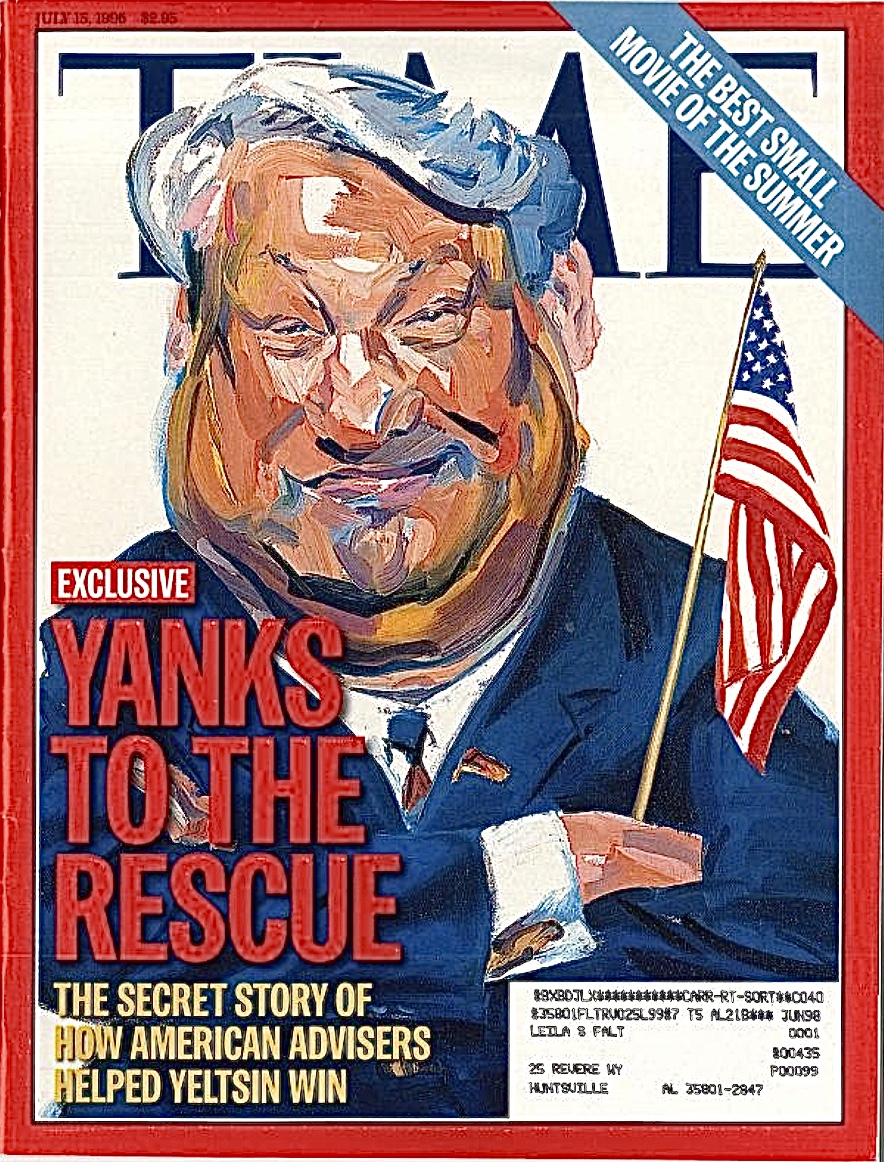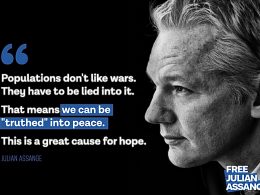In its July 15, 1996 edition, Time magazine featured a cover that boasted about how Washington had just violated Russia’s sovereignty. The story that it covered was something you would expect a radical anti-imperialist publication to report on while the legacy media outlets ignored it, but in this case, it was the legacy media which did the most to bring the story to light. By Time’s own description, the story was about how “For four months, a group of American political consultants clandestinely participated in guiding Yeltsin’s campaign.” This meddling effort, the article said, was primarily behind Yeltsin’s beating his communist opponent in the election, an outcome which it admitted “was by no means inevitable.”
I say that the legacy media has primarily been behind the effort to expose Washington’s interference in that election because twenty years after this story’s publication, the infamous Time cover, featuring a portrait of Yeltsin and a celebratory headline describing the meddling operation, popped up on social media. Time couldn’t have provided a better piece of rhetorical ammunition for the political commentators who skeptically viewed the claims of “Russian interference” in the 2016 U.S. presidential election.
These commentators could handily point to proof, put forth by the USA’s own major media, that Washington had been engaging in precisely what it was now accusing Moscow of doing. Whether this proved the Russian hacking accounts were false was another matter, though there’s evidence those accounts have a shaky foundation. The point is that this cover from a generation ago had unintentionally come to serve as a powerful tool for instilling the kind of doubt in the prevailing media narratives which I began to experience during that time.
Because of this cover, many people in addition to myself have gotten influenced towards questioning what our most powerful media outlets tell us about Washington’s adversaries. We know this because the discourse the cover generated during and after the 2016 election cycle was substantial enough as to warrant a clapback from said media outlets; at one point, The Daily Beast featured a column which angrily proclaimed that the charges of U.S. meddling in Russian politics were absurd. The argument this article puts forth is a familiar one when it comes to commentary which defends U.S. foreign policy. This being that Washington’s actions in the given situation were supposedly benign, in contrast to the unacceptable actions that Washington’s adversaries are always portrayed as engaging in.
Whether you accept the Daily Beast’s case depends on how you view Washington’s “rules-based international order,” on whether you’re willing to believe this order has a right to exist. If one believes Washington and the “west” deserve to be in charge of the globe, the meddling the U.S. geopolitical bloc carries out can be seen as justified, and therefore get reframed as being not meddling but rather aid to friends of “democracy.” The alternative is to go against every aspect of how our cultural hegemony talks and and thinks about the way the world works.
If Washington was in the wrong for sending operatives to manage post-Soviet politics, a foreign policy measure which was done in order to impose catastrophic neoliberal shock policies onto Russia, then how sure can one truly be that Washington is to be trusted in the accusations it makes? A country that’s perpetually seeking to dominate and exploit the globe, rather than act as a friendly “world policeman,” isn’t one that can be relied upon to tell the truth about global affairs. Everything it says has an ulterior motive.
As soon as you admit Washington is a hypocrite for crying Russian meddling, every other part of the imperialist media’s narratives becomes recognizable as suspect. You become more willing to look at the evidence of Ukrainian war crimes, or of the 2014 Euromaidan overthrow having been a U.S.-orchestrated coup, or of Kiev’s support for neo-Nazi militias. You may even become more open to the Marxist analyses that these facts relate to, and accept the Leninist socioeconomic case for why Russia lacks the role of an imperialist power.
The same applies to the narratives about Washington’s other geopolitical targets. If Ukraine indeed has deep historical and cultural ties to Russia, a reality imperialism’s propagandists seek to cover up, it’s a lot easier to see how Taiwan has similarly fundamental links to China. And how in that case as well, imperialism is trying to conceal the full context behind the relationship the two given places have so that driving a wedge between them is easier.
Washington sees both Ukraine and Taiwan as nothing more than locations for proxy warfare. It’s trying to provoke China into taking military action within Taiwan, like it did with Russia in Ukraine. Across multiple fronts in the new cold war, the imperialists are doing the equivalent of what they did in Korea: establish a proxy military presence in a part of Korea (the south), exacerbate this manufactured division within the country by provoking the country’s anti-imperialist part using the U.S.-controlled part, then blame the anti-imperialist part when it acts to neutralize the threat from the imperialist proxy state. This is what happened when the south’s U.S.-backed dictator planned to invade the north, prompting Kim Il-Sung to intervene. For acting in his people’s best interests, Kim was labeled the aggressor, and Washington was given sanction by the U.N. to intervene to stop his “aggression.” This let the U.S. murder several million Koreans and burn down every town in the north with impunity, like how the Ukrainian U.S. puppet state is continuously getting away with war crimes throughout its counteroffensive.
Because Washington has provoked Russia by using Ukraine as a comprador fighter, and has aggressively censored or stigmatized any content documenting evidence of the 2014 coup, it’s been able to claim to have no role behind creating the present conflict. It’s also concealed the actions of the Ukrainian puppet state that provoked Russia into intervening, namely Kiev’s campaign to ethnically cleanse the Russian speakers and Kiev’s pursuit of putting nuclear weapons along Russia’s borders. All of these realities are preemptively rejected by a mind that’s been trained in the mentality that the imperialist media conditions people into. This is a mentality of analytical stuntedness, where any information contradicting what NATO says about the Ukraine conflict is viewed as malicious propaganda. Even when this information includes huge parts of Eurasia’s long-term and recent history, or when there are clear parallels between Washington’s actions in Ukraine and Washington’s past imperialist schemes (such as the one in Korea).
All of these ideas appear outlandish to somebody who’s only been exposed to the pro-NATO side of the story. But when you encounter odd things like the 1996 Time cover, things that don’t match up with what you’ve been told about the USA’s global role, this side of the story starts to look not so plausible. You may become inclined to seek out different sources of media, ones that don’t only report on Washington’s imperialist machinations when they want to portray these things as good. You might find Consortiumnews, which reported on how digital forensics disproved the Russian hacking account. Or The Grayzone, which reported on how the west has continued to carry out more recent meddling within Russia in the form of covert foreign media psyops. The end point in this process of self-education, I’ve found, is to come to recognize Russia’s actions in Ukraine as justified, as the actions of the DPRK in the Korean war were justified. Both are victims of imperialist warfare that have had no choice but to defend themselves.
This is why Casey Michel, the author of that defensive Daily Beast column who’s since gone on to write an infamous Atlantic article calling for Russia to be balkanized, was compelled to respond to the discourse about the Time cover. Washington’s propaganda from after the fall of the Soviet Union had become too brazen for its own good. Washington felt too comfortable during that moment, and made a mistake in allowing its media lackeys to document its dirty tactics within the former USSR. When Russia broke away from U.S. client state status, and Washington brought back its old maneuvers for trying to break Russia, this old propaganda came back to work against Washington’s goals.
—————————————————————————
If you appreciate my work, I hope you become a one-time or regular donor to my Patreon account. Like most of us, I’m feeling the economic pinch during late-stage capitalism, and I need money to keep fighting for a new system that works for all of us. Go to my Patreon here.








